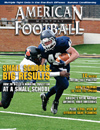Article CategoriesAFM Magazine
|
Coaching In Denmark (Part II)© More from this issueBy Wayne Anderson
In this next installment of coaching in Denmark, I would like to share more about the teaching aspect of coaching a team like the Odense Swans. The first thing you must remember about a team like the Swans is that what you can truly do as a coach depends on how many coaches you have on your staff and how many players consistently participate in practice. In Denmark, our season is divided into two different parts: April to late June and August to early October. During July and early August, Danish families typically take their summer vacations, so there is no formal football activities scheduled at this time. As a general rule, most clubs have better player participation during the first half of the season then the second half. Bec....The full article can only be seen by subscribers.
|
|
|||||||
| HOME |
MAGAZINE |
SUBSCRIBE | ONLINE COLUMNISTS | COACHING VIDEOS |
Copyright 2025, AmericanFootballMonthly.com
All Rights Reserved





